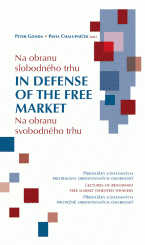 |
|||||||
| INSTITUTE | CONSERVATISM | M.R.STEFANIK |
| NEWS
|
[26.09.2005, Marta Ďurianová, NEWS]
All Slovak taxpayers - individuals as well as corporations - have a chance to assign 2 percent of their yearly income tax to the good cause of their own choosing. Currently, they can select from registered non-profit organisation working in the fields of development and protection of intellectual values, health, environmental education, sports, and culture and natural values. However, the Slovak government has recently approved an amendment that changes the rules. According to the proposal, those who earn less than Sk14,600 (€380) a month (gross pay) cannot exercise their choice to donate 2 percent of their annual income tax to their favourite NGO. Currently, taxpayers can assign 2 percent of taxes to NGOs as long as they meet a minimum threshold of Sk20 (50 euro cents). The proposal changes the minimum assignation to Sk250 (€6.50). The proposal also caps a maximum donation, limiting the overall transferable amount to Sk5 million (€130,000). Critics say that the proposal hurts regional and local NGOs the worst, as they rely heavily on funds from lower income groups. "These amendments will significantly lower the number of people able to give as well as the volume of financial aid that flows to organizations that benefit the public," said First Slovak Non-Profitable Service Centre NGO (1.SNSC) and Citizens to Themselves initiative in a joint statement. Ondrej Dostál, the director of the Conservative Institute of M. R. ©tefánik, told The Slovak Spectator that an average worker with two children would have to earn a gross salary of at least Sk19,211 (€500) to participate in the 2 percent assignate. According to the Slovak Statistics Office, the average monthly salary in Slovakia represented by the first quarter of 2005 is Sk16,022 (€415). A majority of Slovaks earn less. The Finance Ministry explained that the increased minimum assignation level is being introduced to make up for administrative costs. However, when asked directly by the Spectator, the ministry failed to supply a reason for introducing a cap on 2 percent donations. In an article published in a leading Slovak daily, Dostál suggested that the Finance Ministry is introducing a cap because it wants the money for itself. "We can only think that the Finance Ministry does not like the frequency with which corporations exercise their choice to donate 2 percent of their income taxes to NGOs. It is a loss for the state budget. However, the more the state budget saves, the more NGOs lack funds," he wrote. According to Milan Andrejkovič from 1.SNSC, the income tax donations have veered from their original intent. "The original idea of the assignation programme was to give a citizen the choice to help a concrete NGO which he or she knows through his or her taxes," Andrejkovič said. But according to him, the programme has shifted. Now it simply gives Slovaks a chance to rescue what would otherwise die off. "The assignations have to supplement the state's role. The most successful recipients of assignations are mostly the healthcare and education sectors, because those are the most starving fields in Slovakia," Andrejkovič told The Slovak Spectator. Large NGOs in cities like Bratislava should not fare too badly by the new proposals. "It is mainly smaller NGOs that function thanks to a narrow circle of supporters that will get hurt. They are located in smaller towns and villages. They can live thanks to the assignations. If limitations are adopted, this would liquidate them," said Andrejkovič. Parent associations that support schools are one example of the NGOs that will suffer. Most of these are able to buy blackboards, chairs and chalks for their children's classes because of transferred tax donations. 1.SNSC agrees that legislation pertaining to the 2 percent assignation needs some amendments but it is mainly in the area of transparency. In 2004, a large amount of money, about Sk845 million (€22 million), was assigned to NGOs for the first time. The reason for the increase in volume was an increase in assignation from 1 to 2 percent. Furthermore, the assignation programme was extended to corporations. "We would like to make assignations from corporations more transparent because suddenly it is such a large amount of money. We would like the legal entities to lose their anonymity in assignations. On the other side, recipients should publish which projects they use assigned money for," Andrejkovič from 1.SNSC explained. 1.SNSC prepared recommendations for legislation changes and submitted them to the Finance Ministry. However, the ministry ignored the centre's proposals and instead proposed the limitations mentioned above. Article was published in the Slovakia`s English-language weekly The Slovak Spectator. |
 English | Slovak
English | Slovak
This website was created also thanks to funding granted by The Trust
for Civil Society in Central and Eastern Europe.
Website powered by Metafox CMS from Platon Group.
|
Conservative Institute of M. R. Stefanik |
Tel.:
+421 258 100 188 |

 Tax & Audit - You will have to earn an above-average income to participate in tax assignation programme
Tax & Audit - You will have to earn an above-average income to participate in tax assignation programme





